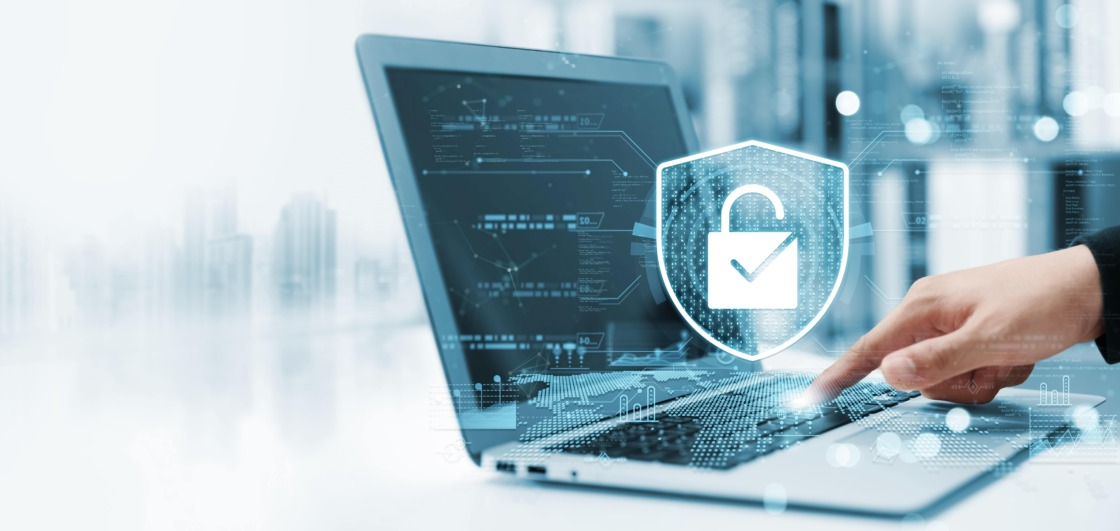Can I become a hacker’s target? Is protecting my online data and computer files worth the extra effort? The answer is always “yes.” Whether you use your computer for private or professional purposes, you’re a potential target for cybercrime.
If now you’re thinking, “Really? Who cares about my one-person freelance business? Cybersecurity is for big fishes,” we won’t try to prove you wrong. But these statistics will:
According to the report by Coveware, cyber extortion recovery specialists, every 6 out of 100 companies with 1 to 10 employees become victims of ransomware. One of the reasons is that small businesses don’t suspect hackers to target them instead of big, rich, and influential companies.
Therefore, they’re likely to lack the necessary protection against most common cyber threats or even don’t know the basic cybersecurity tips for freelancers.
As a freelancer, you receive and store sensitive client information, so it’s your responsibility to protect it, especially under EU data protection laws (GDPR). This includes protecting client data and ensuring digital security.
If you work remotely, your laptop is like a hand for a carpenter or a leg for a football player. Simply put – it’s your money, and you should protect it against cyber attacks. Implementing cybersecurity tips will safeguard your freelance business. We’ll show you how.
Best cybersecurity practices for freelancers
Remote workers must stay vigilant against cyber threats, protecting their files, devices, personal and financial information, and client data. Luckily, we have robust solutions to help you stay protected. Check our list of cybersecurity tips for freelancers.
Strong passwords and password manager – essential security practices
Using a password manager that generates and remembers your passwords is a must-have for every computer user, let alone a freelancer.
It might seem common knowledge, but let’s stress it – you shouldn’t use the same password for several logins. Coming up with new complex passwords for every login is necessary to ensure cybersecurity, and it’s better to keep all of them in a safe password manager vault.
For everyday use, you can go for free tools – Google Password Manager or Apple Keychain. They’re both major steps towards protecting your online accounts. Organizations should opt for paid managers, such as Bitwarden, LastPass or 1Password, or an open-source one – KeePass.
Another safe habit is to change passwords regularly, e.g., every six months. With a password manager, it’s way more convenient. The app will generate as many random strong passwords as you want.
When you enter a password to your password manager, save it along with the login page. One of the phishing methods is to fool you into logging in to a fake login page and consequently give away your username and password. You can prevent it thanks to a password manager that will autofill your password only on the exact URL.
All in all, password manager assistance is threefold:
- it securely stores your passwords and lets you access them all in one place;
- it generates strong, unique passwords for every login;
- it remembers login pages, protecting you from phishing scams, including fake login pages.
Antivirus – your defense against cyber attacks
Picking the right antivirus software is necessary for every computer owner, especially for someone who relies on it as their means of work. The built-in antivirus protection might be insufficient. Research the most reliable antivirus software and install one that provides extensive digital security for freelancers, including:
-
- malware and ransomware prevention – to detect and block malicious software used by hackers to steal data and harm computer systems;
- email filtering – it’ll help you detect phishing attacks and spam;
- low memory usage – choose a lightweight antivirus to save RAM for your working files;
- reliable customer support – check if you’ll have ongoing access to consultants who solve problems with antivirus software;
- firewall software – pick an antivirus with a firewall package to block your network from external cyber attacks, ensuring safe web browsing and file transfer;
- browsing protection – to search the web without worrying about malicious websites and links.
No matter what antivirus protection you want to employ, always scrutinize its privacy policy first. Opt for reputable companies with transparent privacy policies that prioritize your data protection. Look for options that allow you to control what data is collected and how it’s used.
You can also consider using an online virus scanner, such as VirusTotal, but be careful using a free plan – your files might not be completely private.
Virtual Private Network (VPN) – to protect your internet traffic
Why do so many YouTubers promote virtual private networks in their videos? It’s really useful for everyone working remotely from various places because it lets you use the internet via a private and encrypted secure connection.
With a VPN, every location is a safe location. It boosts your cybersecurity level in several ways:
- your location, IP address, and personal details are protected from hackers;
- you can access websites and apps abroad as if you were in your country;
- you have a fast internet connection;
- your files are shared securely.
With a VPN, you can work outside the house and connect your personal devices to public Wi-Fi without risking client data theft or losing your files.
Multi-factor authentication (MFA) for all your devices
It’s a barrier that enforces at least one more credential apart from a username and password to log in to a website or app. This extra security layer can be a fingerprint, facial recognition, an authenticator app, a one-time SMS code, etc. If MFA requires only one more credential, it’s called two-factor authentication (2FA).
Sometimes, when you set MFA, you’ll get a list of backup codes you can use in case you lose access to your phone number and can’t read a text message code. This method is employed, e.g., in Hubspot. Print and keep them in a safe place (but don’t forget where!)
Advanced authentication can protect your devices against cyber attacks, e.g., phishing scams, brute force attacks (password guessing), ransomware, or keyloggers (tracking keystrokes). Many apps have multi-factor authentication turned on manually, so go to the settings and check if it’s possible.
Software updates – cyber threats under control
If your device constantly asks you to schedule an update, and you close the tab thinking, “Leave me alone,” we get it. But it can harm your cybersecurity. You should update your operating systems and programs whenever an update comes up. A new version of software may have more advanced data breach protection features.
Luckily, browsers and most software update automatically, so your only job is not to turn it off.
Anti-phishing email scanners – watch out for giving away sensitive data
Phishing attacks aim to steal essential data, such as card numbers, tax information, or passwords, by acting as a legitimate institution and tricking individuals.
Phishing is widely used in email cybercrime involving data breaches. For example, a freelancer can get an email that looks like a message from a platform they use, requesting to provide their password because they’ve noticed suspicious activity or a log-in attempt.
Such emails usually contain a harmful link that lets hackers gain access to your data. In this FTC’s article, you’ll find a phishing email example that aims to extort payment details from Netflix users.
To recognize a phishing email, always check the sender’s name, email address, and domain (e.g., @hotmail.com). Do it right when you see an email in your inbox. Then, be alert to the signs described below – we can detect many scams ourselves. However, you can also rely on email security solutions integrated into your inbox.
How do you recognize phishing emails? Watch out for these features:
- different email domain, e.g., gmail.com instead of the company domain,
- different email domain that looks very similar to the right one, e.g., with 0 instead of O or rn instead of m.
- a generic greeting instead of your name,
- urgent call to action, prompting you to do something immediately, now,
- misspellings or bad grammar,
- suspicious and unknown links or attachments,
If you end up clicking the link in an email, stay on the lookout for phishing signs on the website – always check if the URL is correct.
Regular backups – keep your files and data safe
Cybersecurity means eliminating the risk of losing your files – because of malware, losing your device, or a computer failure. It’s one of the most common cybersecurity threats. So, the next position on our list of security tips for freelancers is to back up your files regularly.
As a rule of thumb, you should follow the 3-2-1 backup method:
- have at least 3 copies of an important document;
- store them in 2 locations on your device or a cloud;
- keep and update at least 1 external backup copy.
You can keep your backup on a device, e.g., a portable hard drive or encrypted cloud. Consider setting up an automatic cloud backup to securely store every file in the backup location.
Take cybersecurity risks seriously – don’t just do a backup, but check if the backup actually works. Make sure you can access your files whenever you need them.
Proven cybersecurity tips for freelancers – data encryption
Imagine you could log in to a file like you log in to Facebook or email – with a password. Adding a password to protect your files from unauthorized access is called data encryption.
File encryption comes in handy in case your device gets stolen or used by others with your permission. If a file contains sensitive information, e.g., about your clients, finances, or projects, data encryption will make it safer even if someone else accesses your computer.
If your encrypted files have backups, be sure to protect them with a password as well. It’ll be helpful in case your device breaks and you lose your folders.
Here, you can find instructions for encrypting files in Windows 11, Windows 10, and macOS. It’s quick and easy!
Data encryption doesn’t refer only to files. You can encrypt far more sources of sensitive information, such as your cloud storage, emails, or online activities. To prevent spying on your internet usage, encrypt your wireless network using WPA2 or WPA3. Check this instruction on how to secure your home Wi-Fi network.
Secure file transfer – a must-have for remote work
When sharing important or confidential files with clients or remote workers, use secure file transfer tools with advanced encryption and access control. Such tools go beyond the security measures of regular email attachments, protecting the data.
The key features to look for in file transfer tools are password protection, file tracking, link expiration, and end-to-end encryption, which scrambles data throughout transfer so it’s inaccessible even to the service provider.
Inform clients about your security measures and how they can securely share files with you.
Credit report check – track your financial information
Thanks to periodic checks on your credit report and credit score, you’ll have control over any possible credit fraud. Your bank details can be subject to data and identity theft and consequently used to steal money. To investigate your credit report, check what institution stores and share credit information in your country.
Ongoing education – cybersecurity training never ends
A common cybersecurity myth is that the main cybersecurity threats are well-known. Unfortunately, as with other IT-related areas, the infamous ones are also expanding. Cybercrime is increasingly sophisticated and harder to prevent.
Stay updated with the news about cyber threats and measures to avoid them. Consider attending a cybersecurity awareness course, workshop, or other form of training. There are specialists who can help you become more aware of risks related to remote freelancing.
As your freelance business evolves and your project changes, new threats and vulnerabilities may arise. Update your cybersecurity strategy to current conditions.
Protect your work: select a freelance service committed to cybersecurity
Freelance cybersecurity can be user-friendly if you invoice your clients via Useme. Our security measures apply to every step of your transaction:
- You upload and share your files via secure file transfer. We keep them protected until your client pays the deposit request.
- Your clients pay through a safe payment gateway, letting us safeguard the payment until we get your working files.
- We store your and your client’s data, complying with the law and our internal privacy policy. Useme protects your personal data, files, and banking details using best-in-class cybersecurity solutions.
Useme is your trustworthy freelance toolkit. We protect your financial well-being not only by safeguarding your sensitive data but also by eliminating late payments. If you invoice your client via Useme, you’ll get paid right after your client pays a deposit request.
Advanced cybersecurity tips for freelancers
Even if you’ve already implemented all the precautions mentioned above, there’s a space for improvement – you’re right. You can’t be too careful. So, if you really want to be cybersecurity savvy, check these:
Universal 2nd Factor
The U2F security key will protect your online account even if your password becomes compromised. It’s an element of two-factor authentication, regarded as one of the most secure cybersecurity practices.
Universal 2nd Factor is a physical device similar to a USB thumb drive. Here’s how it works:
- You buy a U2F key and register it with the website or app you want to secure with two-factor authentication. Important note: always buy new and original U2F keys from verified sources.
- Once you enter your login and password, the website or app will prompt you to plug in your U2F key to authorize the access.
To be always on the safe side, buy two security keys and keep one at home in case you lose your portable one. You can also use security keys on iPhones – find more information from Apple here.
Faraday laptop sleeve
Faraday cage technology blocks electromagnetic fields. It’s used in Faraday laptop sleeves, bags, briefcases, and backpacks designed to enhance the privacy and security of computer data. Faraday technology protects the information on your device from external signals and networks.
Faraday cages block signals from mobile phones, Wi-Fi, Bluetooth, GPS, EMF, EMP, RFID, NFC, and sat-nav. A Faraday pouch is also used to protect your car from being stolen. Thieves won’t be able to open your car by picking up the signal of your keyless entry system.
Privacy filters for laptops
Privacy filters offer a simple and effective solution to shield your data. They’re thin sheets of plastic that adhere to your laptop screen and significantly narrow the viewing angle of your screen. As someone tries to view your screen from an angle, the filters block most of the light. To a side viewer, your screen appears darkened or even completely black, obscuring sensitive information.
As a result, you can use your laptop on a train or in a café without the risk of other people seeing what you’re doing. Besides, a lot of us just don’t like writing, designing, or coding “on display.”
Cybersecurity practices for freelancers – where to start?
If you’re feeling a bit green about cybersecurity, don’t worry – take one step at a time. Start with what you know. You certainly have accounts on multiple websites and apps. Check if you use unique and strong passwords and save them in a chosen password manager.
Then, make sure you store all your files in two backup copies. If not – create one on an internal hard drive and one on an online cloud. Encrypt both locations.
Now, you can dive into researching. Look for recommendations about antivirus software and a VPN. Your cybersecurity is your responsibility – don’t be a sitting duck!




